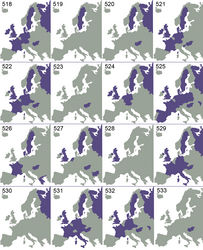Omphale aceris
| Notice: | This page is derived from the original publication listed below, whose author(s) should always be credited. Further contributors may edit and improve the content of this page and, consequently, need to be credited as well (see page history). Any assessment of factual correctness requires a careful review of the original article as well as of subsequent contributions.
If you are uncertain whether your planned contribution is correct or not, we suggest that you use the associated discussion page instead of editing the page directly. This page should be cited as follows (rationale):
Citation formats to copy and paste
BibTeX: @article{Hansson2012ZooKeys232, RIS/ Endnote: TY - JOUR Wikipedia/ Citizendium: <ref name="Hansson2012ZooKeys232">{{Citation See also the citation download page at the journal. |
Ordo: Hymenoptera
Familia: Eulophidae
Genus: Omphale
Name
Omphale aceris (Erdös) – Wikispecies link – Pensoft Profile
- Secodes aceris Erdös, 1951:208. Lectotype female in HNHM, examined.
- Omphale aceris (Erdös), Graham (1963)[1].
Material
Type material. Lectotype female, type no. 6063 in HNHM.
Diagnosis
Gaster short, 0.8× as long as length of mesosoma; forewing speculum open below, with veins and setae yellow; antennal flagellum with basal 2 flagellomeres pale brown and apical 3 flagellomeres yellow (Fig. 422); legs white; row of admarginal setae mainly arising from marginal vein; radial cell bare.
Description
Female. Length of body 1.4 mm. Antenna with scape dark brown with basal part white; pedicel pale brown; flagellum with flagellomeres 1–2 pale brown, flagellomeres 3–5 yellow (Fig. 422); pedicel + flagellum 1.5× as long as distance between eyes; first flagellomere 1.2× as long as and about 1× as wide as second flagellomere; flagellomeres with scattered short setae; clava 2-segmented. Face golden red, with raised reticulation; clypeus golden red, smooth, trapezoid, 1.6× as wide as high; gena purple metallic; lower frons purple metallic (Fig. 420), with raised reticulation (Fig. 419), subtorular area smooth; interscrobal area with raised reticulation; antennal scrobes join on frontal suture; frontal suture V-shaped; upper frons and vertex purple metallic, with raised reticulation. Occipital margin rounded (Fig. 421).
Mesoscutum golden with green metallic spots (Fig. 418), with engraved reticulation (Fig. 417), midlobe with two pairs of setae; notauli as indistinct impressions. Scutellum black with purple metallic tinges (Fig. 418), with engraved reticulation (Fig. 417); 1.0× as long as wide, with anterior margin straight. Axillae golden with purple tinges (Fig. 418). Dorsellum purple metallic (Fig. 418), with very weak sculpture and flat (Fig. 417), 0.4× as long as wide, and 0.4× as long as length of median propodeum. Entire lateral mesosoma purple metallic, except yellow acropleuron; transepimeral sulcus weakly curved forwards. Propodeum golden with red tinges (Fig. 418), smooth (Fig. 417); propodeal callus with two setae. Legs white; midleg with first tarsomere 0.3× as long as length of tarsus. Forewing transparent, veins and setae yellow; speculum open; radial cell bare; postmarginal vein about as long as stigmal vein; stigmal vein slender. Hind wing transparent, apex rounded. WIP not possible to see on single examined specimen because the wings are glues to the card.
Petiole dark brown. Gaster purple metallic, first tergite with golden tinges, short and 0.8× as long as length of mesosoma; 7th tergite 0.06× as long as length of gaster.
Male. Unknown.
Hosts
Unknown.
Distribution
Hungary (Erdös 1951[2]) (Fig. 533).
Remarks
Through the pale wing veins, pale legs and part of the antenna this is an easily recognizeable species. However, based on the single shriveled female specimen examined we find it difficult to place it in a group. Possibly it belongs in the phruron-group but to establish that fresh specimens, preferably both sexes, must be examined.
Taxon Treatment
- Hansson, C; Shevtsova, E; 2012: Revision of the European species of Omphale Haliday (Hymenoptera, Chalcidoidea, Eulophidae) ZooKeys, 232: 1-157. doi
Other References
- ↑ Graham M (1963) Additions and corrections to the British list of Eulophidae (Hym., Chalcidoidea), with descriptions of some new species. Transactions of the Society for British Entomology 15: 167-275.
- ↑ Erdös J (1951) Eulophidae novae. Acta Biologica Hungarica 2: 161-237.
Images
|

